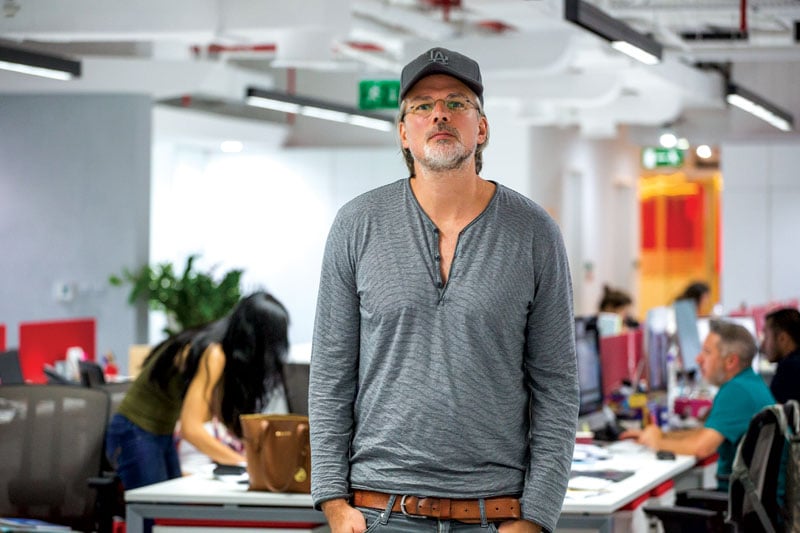Publicis’ new regional executive creative director Jan Leube talks whips, arrows and tears with Eleanor Dickinson

Jan Leube and I are comparing our United Arab Emirates identity cards. Given both of us have been in Dubai less than two months, our mugshot-stamped keys to expat life still remain something of a novelty. As the new regional executive creative director for the Middle East and North Africa at Publicis, Leube already has a lot to readjust to, not least the change in climate from his former Berlin home. It is perhaps just as well he is taking it one day at a time.
“I hate all this talk about formulating big goals and big battle cries,” he replies when asked about his vision for the agency. “It is about just changing the way one thinks about Publicis Middle East and achieving that by seeing what works here. And it is just doing things differently in the daily work, improving small little details and trying to create an atmosphere where one really takes pride in the stuff one does every day.”
Having spent the last 15 years at the creative helm at some of Germany’s biggest agencies – most recently Y&R – Leube’s arrival in Dubai follows a somewhat turbulent time for the Publicis Groupe-owned agency. His predecessor, multi-award winning Alex Brunori, recently stepped down from the role after just over a year to join Google as head of creative agencies MENA, having been brought in to up the agency’s creative game in May last year. The move followed the completion of the agency’s buyout by Publicis Worldwide at the beginning of 2014, his appointment culminating in the winning of a number of awards at the Dubai Lynx in March, including a gold for Chrysler’s ‘The performer’.
“He [Brunori] was a very ambitious guy and it is very easy to become impatient,” says Leube. “I know for myself how impatient I got when I started as chief creative officer at Y&R Germany and it is no good. It just makes you old and people unsure and less confident.
“There are some agencies out there – they are usually the quite successful ones – that create this atmosphere [of] angst and elbow and I have always avoided that because I think an agency should be an angst-free zone. It should be a bunch of intrinsically motivated guys that, if they were not here, they would be out there being creative. It should be about sharing stuff, making the other guy laugh and not about cracking whips and creating tears.”
From the glass-walled vantage point of Leube’s office, the Publicis team appear relaxed in their wood-floored, minimalist environment – and certainly none whom I could see had broken down in tears.
Despite a long, deserted desk directly in eyesight, Leube says the agency is currently ‘full’ with around half a dozen new team-members starting alongside him. The desk’s emptiness contrasts with Leube’s office, which contains a series of eye-catching posters – still a work in progress, he says – depicting variations of a dungaree-wearing man with an arrow. Though you could be forgiven for mistaking them as being for some obscure division of the Soviet labour force – the red and white colour does not help – these posters pinpoint Leube’s vision of creating work that is ‘higher, sharper, faster’.
“The point of view of a creative in advertising is always the point of view of a guy who wants to tell stories,” he explains. “And of course stories are always based on conflicts, and conflicts are based on plus and minuses. And a minus is usually something that is not so nice and not so attractive. The creative is always battling to create something with tension. We are arrow-makers. Everything has to be pointed; it has to be sharp. We are aiming to create impact with people. Everything we do should create some kind of impact. It should make you think and feel and buy differently.”
Publicis Middle East is overseen by Raja Trad, chief executive officer of Leo Burnett Group of Companies MENA, with the agency’s move to Dubai Media City completed early last year. It had originally been headquartered in Deira and is creatively overseen by Bechara Mouzannar, Leo Burnett’s chief creative officer for the MENA region.
“Being responsible for creative, you have four frontiers: one is winning new business, one is improving the work you do on a daily basis, another is getting in fresh talent and the final border is winning awards,” says Leube who, despite having more than 300 awards to his name, says he is not somebody who sets out big goals like winning at Cannes. “And unfortunately the developments of the last couple of years have shown that winning awards does not necessarily have anything to do with doing good daily business and winning new clients. These are the borders I have to constantly improve and work on, and that is what I am trying to do.
“It is not by looking at Cannes work all day that people will start producing Cannes work, you have to provide new instruments, sharpen the stuff you produce and make it more cutting-edge. And then if you give them the instruments, people will think in a different way, hopefully have more fun and produce better stuff.”









